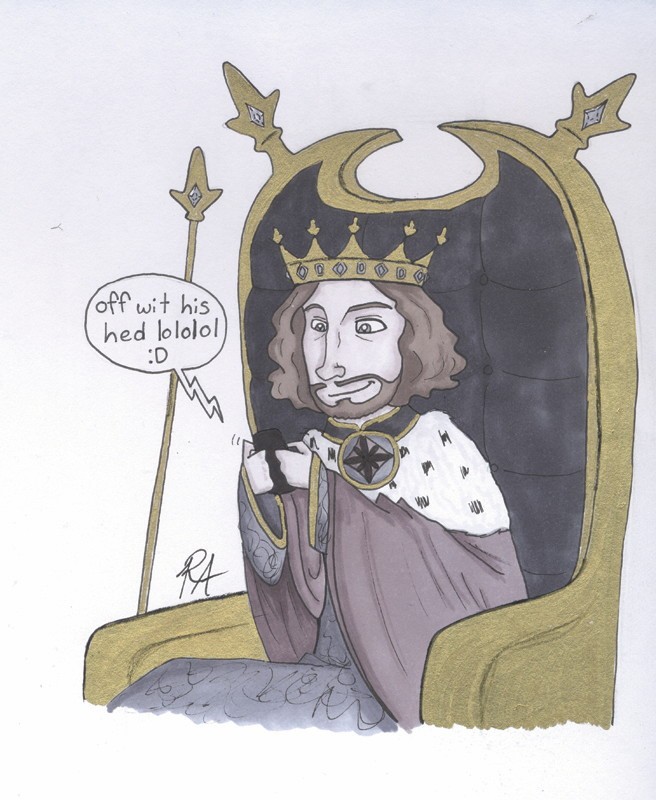Doctoring the historical account
“The King’s Speech” and other fairy tales
Little over a month ago, the Weinstein Company released a 23-minute documentary on the making of the Oscar-winning film “The King’s Speech.” In it, screenwriter David Seidler discusses the long struggle to get the script approved for production by the Crown.
The apparent reason for holding it back was that the story was too “painful” and “embarrassing” to be told while the Queen Mother was still living. It wasn’t until her death in 2002 that the film was finally approved.
As I watched this, I thought, “Why would such a tame story of one man overcoming a personal struggle be so painful?”
Perhaps I should back up a little.
For those who haven’t seen it, “The King’s Speech” follows the epic tale of Colin Firth as he heroically triumphs over his greatest foe. No, it isn’t the Nazis. It isn’t racism, either, or cocaine addiction.
No, Firth has a stutter. The man basically can’t say three words before bursting into a fit of repeated consonants.
This is apparently a big deal, since he’s just inherited the throne and can’t speak in public. He hires a lowly peasant to help him speak, and they eventually look past each other’s differences (one’s rich and dignified! One’s poor! Conflict!) and become friends.
Oh, and Firth reads off a paper into a microphone for three minutes at the end, causing everyone in England to pile into the streets and cheer for some reason.
You may be thinking, “Hey, I thought the movie was about George VI!”
Sure, there are a few things that might give you that impression. Like the fact that Colin Firth’s character is called “George VI” and he’s the King of England. Outside of that, it’s a Firthfest (not to be confused with Girthfest, one of the least appealing summer festivals you can imagine).
Had the film indeed been an historic account of the life of the head of the British Commonwealth from 1936 to 1952, surely it would have contained more documented information about him.
Speaking of which, it is true that George VI had a speech impediment.
In truth, it was decidedly minor; it almost never manifested itself around family and friends, and rarely caused problems in public.
The big issue for George VI wasn’t really the speech impediment itself, but the fear of it manifesting itself at the wrong time. Hence, he hired an Australian speech therapist by the name of Lionel Logue in 1926.
Obviously, Logue’s therapy worked wonders – there is little evidence of an impediment in any of George VI’s recorded speeches.
However, if a minor speech impediment and a heartwarming friendship between a King and his lowly speech therapist was all there was to the story, it would make for a pretty boring movie.
Now, the real history.
“ He hires a lowly peasant to help him speak, and they eventually look past each other’s differences (one’s rich and dignified! One’s poor! Conflict!) and become friends
For starters, George VI was generally considered to be, shall we say, a bit slow. Earl Lloyd George (U.K. Prime Minister from 1916 to 1922) thought of him as a “nitwit.”
Oliver Harvey, a postwar British ambassador, considered the man he represented to be “a fundamentally weak character and certainly a stupid one.”
So, he was dumb, but I guess that’s not his fault.
George VI also had a violent temper, far worse than it is presented in the film.
Those close to him spoke of countless ruined dinner parties and social gatherings due to his tantrums. Historian John Grigg has even stated that there were times when George “became so out of control that he actually struck his wife.”
So there’s that.
And finally, we come to the film’s biggest omission: George VI’s appeasement of the Nazis.
Granted, his support wasn’t nearly as egregious as his older brother Edward VIII, who not only outwardly respected the Third Reich, but was photographed giving the Nazi salute.
No, what George VI (and his wife) did was blatantly support then-Prime Minister Neville Chamberlain, and his decision to give Czechoslovakia to the Nazis.
And by “blatant,” I mean Chamberlain made an appearance on the balcony of Buckingham Palace with the pair after he returned from Munich in 1938, a move that was called “the biggest constitutional blunder that has been made by any sovereign this century.”
Even after Chamberlain was forced to resign in 1940, the couple would not support Winston Churchill and his stance against Hitler.
So there you have it; George VI was a dumb, angry, Nazi appeaser.
Personally, I would have preferred that story, but I understand it’s a tough sell.
Sam Hagenlocher did not watch the Oscars.
Published in Volume 65, Number 21 of The Uniter (March 3, 2011)







